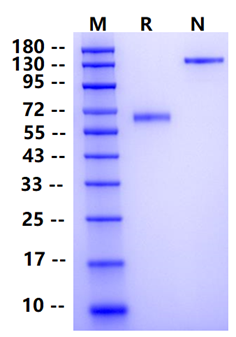1μg (R: reducing conditions, N: non-reducing conditions).
Product Details
Product Details
Product Specification
| Species | Human |
| Synonyms | CXADRL1, Bt-IgSF, CT119 |
| Accession | Q5DX21-1 |
| Amino Acid Sequence | Leu23-Gly245, with C-terminal Human IgG1 Fc &Avi Tag LEVSESPGSIQVARGQPAVLPCTFTTSAALINLNVIWMVTPLSNANQPEQVILYQGGQMFDGAPRFHGRVGFTGTMPATNVSIFINNTQLSDTGTYQCLVNNLPDIGGRNIGVTGLTVLVPPSAPHCQIQGSQDIGSDVILLCSSEEGIPRPTYLWEKLDNTLKLPPTATQDQVQGTVTIRNISALSSGLYQCVASNAIGTSTCLLDLQVISPQPRNIGLIAGIEGRMDPKSSDKTHTCPPCPAPELLGGPSVFLFPPKPKDTLMISRTPEVTCVVVDVSHEDPEVKFNWYVDGVEVHNAKTKPREEQYNSTYRVVSVLTVLHQDWLNGKEYKCKVSNKALPAPIEKTISKAKGQPREPQVYTLPPSRDELTKNQVSLTCLVKGFYPSDIAVEWESNGQPENNYKTTPPVLDSDGSFFLYSKLTVDKSRWQQGNVFSCSVMHEALHNHYTQKSLSLSPGKGLNDIFEAQKIEWHE |
| Expression System | HEK293 |
| Molecular Weight | 60-72kDa |
| Purity | >95% by SDS-PAGE |
| Endotoxin | <0.1EU/μg |
| Conjugation | Biotin |
| Tag | Human Fc Tag, Avi Tag |
| Physical Appearance | Lyophilized Powder |
| Storage Buffer | PBS, pH7.4 |
| Reconstitution | Reconstitute at 0.1-1 mg/ml according to the size in ultrapure water after rapid centrifugation. |
| Stability & Storage | · 12 months from date of receipt, lyophilized powder stored at -20 to -80℃. · 3 months, -20 to -80℃ under sterile conditions after reconstitution. · 1 week, 2 to 8℃ under sterile conditions after reconstitution. · Please avoid repeated freeze-thaw cycles. |
| Reference | 1. Suzu S, Hayashi Y, Harumi T, Nomaguchi K, Yamada M, Hayasawa H, et al. Molecular cloning of a novel immunoglobulin superfamily gene preferentially expressed by brain and testis. Biochem Biophys Res Commun (2002) 296(5):1215-21. |
Background
VSIG3 (V-set and immunoglobulin domain containing 3) is a member of the immunoglobulin superfamily (IgSF), which is also called the immunoglobulin superfamily 11 gene (IgSF11), and it is highly expressed in the brain and testis. Mature human VSIG3 consists of a 219 amino acid (aa) extracellular domain (ECD) that contains two tandem Ig-like domains, a 21 aa transmembrane segment, and a 169 aa cytoplasmic domain. The function of VSIG3 is to stimulate cell growth through homophilic interactions. In clinical, the VSIG3 has been reported to as a novel target for cancer immunotherapy of gastrointestinal and hepatocellular carcinomas. In addition, VSIG-3 is also a ligand of B7 family member VISTA/PD-1H and inhibits human T-cell functions through a novel VSIG-3/VISTA pathway.
Picture
Picture
SDS-PAGE



